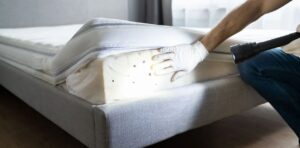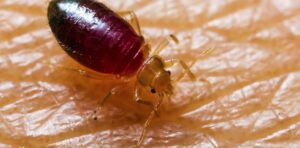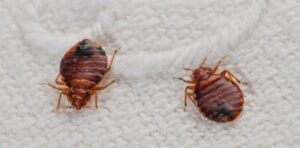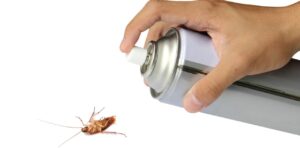Bed bugs do not typically stay on your skin after a shower. These tiny pests tend to hide in cracks and crevices in your bed or furniture, not on your body. Showering can wash away any bed bugs that might be on your skin, but the bugs usually don’t linger there. It’s essential to focus on treating your bedding and living areas to get rid of bed bugs effectively.
It’s a well-known fact that bed bugs are excellent at hiding, but what about their presence on your skin? Many people wonder if they stick around even after a refreshing shower. We’ll explore this intriguing question and separate fact from fiction in the world of bed bug behavior.
To effectively deal with bed bugs, it’s crucial to have accurate information about their habits and characteristics. In the following paragraphs, we will provide you with valuable insights into what happens to bed bugs after a shower and how to address these unwanted guests effectively.
Can They Live On Your Body?
Bed bugs are notorious little pests that can cause significant distress. Many people wonder if bed bugs can actually live on their bodies. The good news is that bed bugs are not equipped to live on your skin. They may be found on your skin temporarily, but they cannot establish a permanent residence there.
Bed bugs feed on blood, and they are attracted to the warmth and carbon dioxide that our bodies emit. This is why you might wake up with bed bug bites. After they’ve had their fill, bed bugs will typically retreat to their hiding spots, such as the seams of your mattress or cracks in the furniture. So, while they may be on your skin briefly while feeding, they won’t stay there after a shower.
A Close Look at Bed Bug Behavior After You’ve Showered
You’ve had a shower, and you’re hoping those bed bugs are long gone, right? Well, in most cases, they are. Bed bugs are not fans of water. They’re not aquatic insects, and they prefer dry, dark, and hidden places. When you take a shower, the water and soap can effectively wash bed bugs off your body.
It’s essential to be thorough. Make sure to wash your body, especially areas where bed bugs are likely to hide, such as in your hair or between your fingers. Once you’ve taken your shower, you should feel confident that you’ve removed any bed bugs that may have been on your skin. The key is to maintain good hygiene and regularly inspect your bedding and sleeping areas to prevent bed bug infestations.
Where Can You Get Bed Bugs?
Now that we’ve established that bed bugs won’t linger on your skin after a shower, let’s explore where you might encounter these unwelcome critters. Bed bugs are excellent hitchhikers, and they can be found in various places. Here are some common sources of bed bug infestations:
Friends and Family

One of the most common ways bed bugs spread is through social connections. Visiting friends and family who have a bed bug problem can lead to you unknowingly bringing them home. It’s essential to be vigilant and inspect your belongings after such visits.
Work
Workplaces can also be sources of bed bug infestations. Bed bugs can hitch a ride on your clothing or belongings and make their way into your home. If you suspect bed bugs at work, take precautions to prevent bringing them home.
Neighbors
If your neighbors have a bed bug problem, there’s a risk that these pests might migrate to your place. Bed bugs can move through wall voids and electrical conduits. Regularly inspect and maintain your home to reduce the chances of infestation.
Second-hand Furniture
Furniture, especially used or second-hand items, can harbor bed bugs. Inspect any pre-owned furniture thoroughly before bringing it into your home. It’s one of the common ways bed bugs enter households.
Traveling
Traveling can expose you to bed bugs in various places, from hotels to public transportation. Check hotel rooms for signs of bed bugs, and be cautious when using public transport or taxis. Bed bugs can be sneaky travelers.
Public Transport
Public transportation, such as buses and trains, can also be infested with bed bugs. While it’s rare, bed bugs can occasionally be found in the seats or on passengers’ belongings. Be cautious and maintain good personal hygiene when using public transport.
Showering Off Bed Bugs Are They Really Cling to Your Skin?
Can a shower rid you of bed bugs? These tiny pests hide in your mattress and bedding, but can they actually cling to your skin? In most cases, bed bugs do not stay on your body. They prefer to feed on you while you sleep and then retreat to their hiding spots. So, a shower alone won’t wash them away from your skin.
Bed Bugs and Their Hiding Spots
Bed bugs are excellent hiders. They dwell in crevices, cracks, and seams in your mattress and furniture. After they feed, they return to these hiding places, making it unlikely for them to remain on your body after a shower. While it’s crucial to maintain good hygiene, you may need professional pest control to get rid of bed bugs completely.
Preventing Bed Bug Infestations
To avoid bed bugs, inspect your sleeping area regularly. Check for tiny reddish-brown insects, shed skins, and small bloodstains on your bedding. If you suspect an infestation, contact a pest control expert. Regular cleaning and vigilant monitoring can help keep your home bed bug-free.
Do Bed Bugs Get In Your Skin
Bed bugs are tiny pests that can cause big problems. They don’t actually get under your skin, but they can bite you. These insects feed on human blood by piercing the skin with their sharp mouthparts. Their bites can leave itchy red welts on your skin.
To protect yourself from bed bugs, it’s important to keep your home clean and inspect your bedding and furniture regularly. If you suspect a bed bug infestation, seek professional help. Remember, while they don’t burrow under your skin, these little creatures can still be a major nuisance and disrupt your sleep.
Do Bed Bugs Get Into Your Private Parts

Bed bugs can be a nuisance, and you might wonder if they can infest your private parts. Thankfully, bed bugs typically don’t target this area. These tiny insects are more commonly found in mattresses, bedding, and furniture, where they feed on your blood during the night. They tend to avoid the areas of your body with little exposure, like your private parts.
To prevent bed bugs from getting into your private areas, it’s essential to maintain a clean and pest-free sleeping environment. Regularly inspect your bedding and mattresses for any signs of bed bugs, such as small reddish-brown bugs or tiny bloodstains. Immediately clean your bedding, vacuum your room, and seek professional help if necessary if you suspect an infestation.
What are the chances of bed bugs laying eggs in your hair?
The chances of bed bugs laying eggs in your hair are extremely low. Bed bugs prefer to hide in cracks and crevices near their human hosts, such as in mattresses and furniture. They primarily feed on blood, not hair, and their tiny size makes it challenging for them to navigate through hair strands.
Bed bugs don’t have the necessary adaptations to lay eggs in hair. They lack specialized structures like lice or ticks that enable them to anchor securely in hair. In most cases, you’ll find bed bug eggs and nymphs in and around your sleeping area, not in your hair. So, while bed bugs can be a nuisance, worrying about them laying eggs in your hair is not a common concern.
Do Bed Bugs Lay Eggs In Your Ear
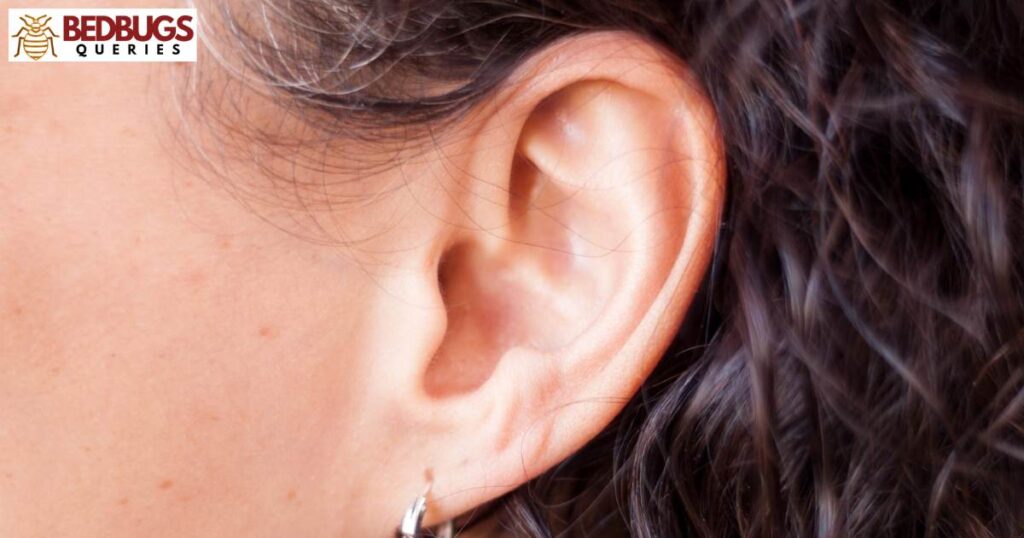
Bed bugs do not lay eggs in your ear. These tiny pests are more interested in hiding and feeding on human blood. Their preferred hiding spots include cracks in furniture and seams of mattresses. While bed bugs can travel around your body, they are not known to lay eggs in your ears. If you experience discomfort in your ear, it’s more likely due to another issue, such as an ear infection or foreign object, rather than bed bug eggs.
| Question | Answer | Explanation |
| Do Bed Bugs Lay Eggs in Your Ear? | No | Bed bugs do not lay eggs in ears. They prefer to hide in furniture and bedding. |
| Ear as a Common Site | No | Ears are not a common site for bed bug infestations. |
| Bed Bug Preferred Spots | Furniture, bedding | Bed bugs lay eggs in cracks and crevices near sleeping areas. |
| Health Risks | Minimal | Bed bugs in ears are rare and not a significant health concern. |
| Symptoms | Itching, and discomfort | If you experience ear discomfort, it’s likely not due to bed bugs. |
| Consult a Doctor | Yes | If you have unusual ear symptoms, consult a medical professional. |
If you suspect you have bed bugs in your home, it’s essential to take action to get rid of them. Look for signs like small red bites, bloodstains on your bedding, or tiny dark fecal spots on your mattress. Consult with a pest control professional to effectively eliminate the bed bug infestation and prevent any further discomfort or inconvenience.
Are bed bugs able to lay eggs in your nose?
No, bed bugs cannot lay eggs in your nose. Bed bugs typically infest places where they can easily access a blood meal, such as your bed or furniture. They feed on your blood while you sleep, but they do not lay eggs in your nose. Bed bugs prefer to lay their eggs in cracks and crevices in and around your bed, not in your body.
To avoid bed bug infestations and ensure your home remains pest-free, it’s crucial to keep your living environment clean, inspect your bedding and furniture regularly, and take proactive measures to get rid of bed bugs in the carpet. If you suspect a bed bug infestation, consult a pest control professional to properly address the issue. Rest assured, bed bugs do not lay eggs in your nose, so there’s no need to worry about that particular scenario.
Frequently Asked Questions
How long can bed bugs stay on your skin after a shower?
Bed bugs typically won’t remain on your skin after a shower. They are repelled by water and will be washed away with proper cleansing.
Can bed bugs survive the heat of a hot shower?
Bed bugs are sensitive to heat, and a hot shower can be an effective way to eliminate them from your skin. The heat will usually drive them away.
Are there any long-term health risks associated with bed bug bites?
While bed bug bites can be itchy and uncomfortable, they are not known to cause long-term health problems. An allergic reaction is possible in some cases.
Can bed bugs transmit diseases through their bites?
No, bed bugs are not known to transmit diseases through their bites. Their bites may be irritating, but they are not a vector for disease.
Conclusion
In the end, bed bugs don’t stick around on your skin after a shower. They don’t like water and prefer to hide in cozy places like your mattress or furniture. So, if you’ve had an encounter with these pests, a good shower can help wash them away.
While they might not linger on your skin, it’s crucial to be vigilant and prevent bed bug infestations by checking your surroundings and practicing good hygiene. Stay clean, inspect your bedding, and be on the lookout for these pesky bugs to keep them from becoming unwelcome guests in your home.



